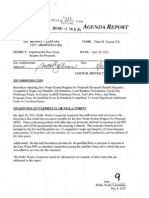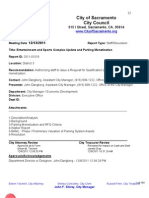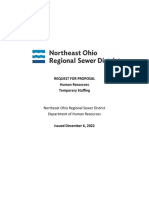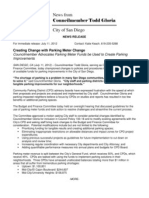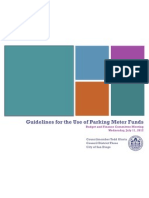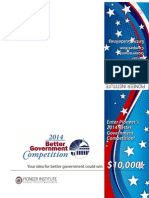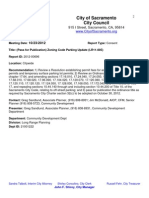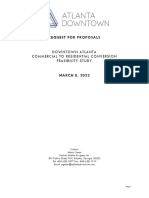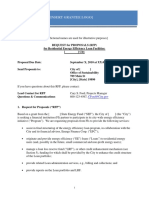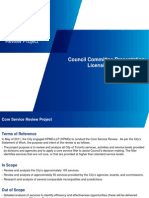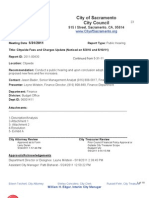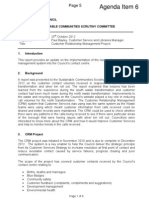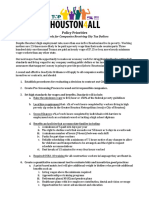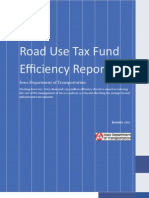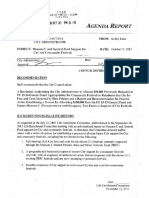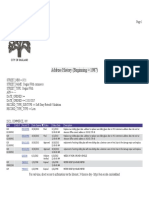11-0379 Report 4
11-0379 Report 4
Uploaded by
RecordTrac - City of OaklandCopyright:
Available Formats
11-0379 Report 4
11-0379 Report 4
Uploaded by
RecordTrac - City of OaklandOriginal Title
Copyright
Available Formats
Share this document
Did you find this document useful?
Is this content inappropriate?
Copyright:
Available Formats
11-0379 Report 4
11-0379 Report 4
Uploaded by
RecordTrac - City of OaklandCopyright:
Available Formats
FFtCEOFTHECfTj OAKLAND
FILED'
Cl EP^
CITY OF OAKLANb2fl/2 Hj^ Y 3 I pl^ 3.
AGENDA
REPORT
TO: DEANNA J. SANTANA CITY ADMINISTRATOR SUBJECT: Supplemental Zero Waste Request for Proposals City Administrator Approval
F R O M : VitalyB.Troyan, P.E
DATE: May 21, 2012
Date
COUNCIL DISTRICT: Citv-Wide RECOMMENDATION Resolution Adopting Zero Waste System Request For Proposals Economic Benefit Measures: Competitive Wages And Benefits, Job Retention, Local Business Participation, Local Hire Preference Points, In-County Landfill Preference Points, Labor Peace, And Requires That Proposals Include A Call Center In Alameda County; And Seeks Proposals From All Qualified Firms To Establish Competition To Avoid Significant Additional Costs To City Rate Payers.
REASON FOR SUPPLEMENTAL OR REPLACEMENT
On May 15, 2012, the Council requested additional information regarding policies in the Resolution that establish economic benefits for the Zero Waste System Request for Proposals (RFP). These contracting policies may affect the cost proposals received in response to the RFP process, to be incorporated into the resulting contracts, but also provide economic benefits to the community. The economic benefit policies included in the Revised Resolution are: (1) competitive wages and benefits, (2) local business participation and presence that includes non-profits and public agencies, (3) 50% local hire, (4) job retention, (5) in-county landfill preference points (6) labor peace, and (7) a requirement for the proposers to the Zero Waste System RFP to include a call center in Alameda County and they may also propose an out-of-county call center, but must demonstrate how they will meet the RFP customer service standards. The Council asked that staff return with additional information on the economic benefits provisions, specifically: Explore local business preference point award for past performance, and describe how points will be earned/ awarded for local business participation
Item: City Council June 5,2012
Deanna J. Santana, City Administrator Subject: Supplemental Zero Waste Request for Proposals Date: May 21, 2012
Page 2
Provide language that ensures franchisee compliance with local hire requirement, including a plan with benchmarks and deliverables Provide language on local hire enforceability/penalties Provide information on cost impacts of economic benefit measures upon customer rates Explore options to address the recycling sorter low wages Provide more information on "best and final offer" process
OUTCOME Approval of the revised resolution will establish the following economic benefit contracting provisions in the RFP: Competitive Wages and Benefits with "Competitive" defined Maximization of Local Business Participation - with preference points and including local business presence (to include non-profits and public agencies) Local Hire Requirement 50% minimum, preference points for exceeding minimum, and methods for enforcement Job Retention - for existing franchise and recycling contract workers In-County Landfill Preference Points Labor Peace - proposers to describe plans for preventing labor unrest Call Center - require that proposals include a call center in Alameda County while allowing proposals for a call center outside of Alameda County that meets the customer service standards and specifications of the RFP Additionally the Resolution allows all qualified firms to propose in response to the Zero Waste RFP, to stimulate competition among the qualified firms and to obtain the most cost-effective services for the ratepayers. BACKGROUND/LEGISLATIVE HISTORY The City of Oakland's Franchise Agreement for Solid Waste and Yard Waste Collection and Disposal Services with Waste Management of Alameda County (WMAC), and the Agreement for Residential Recycling Service with California Waste Solutions (CWS) expire; on June 30, 2015. On January 17, 2012, the City Council adopted Resolution No. 83689 C.M.S., establishing a framework for the Zero Waste System Design including a single franchise for citywide garbage and organics collection services, a single franchise for citywide residential recycling, and landfill capacity procured separately from collection and processing services. On February 21, 2012, the City Council adopted Resolution No. 83729 C.M.S., establishing a process and schedule for releasing a RFP to procure new contracts to provide the services that the System Design comprises. On April 3, 2012, the City Council adopted Resolution No. 83783 C.M.S., establishing proposal evaluation criteria weighting, approving use of an industry-related index or Item: City Council June 5, 2012
Deanna J. Santana, City Administrator Subject: Supplemental Zero Waste Request foi- Proposals Date: May 21, 2012
Page 3
adjusting customer rates, providing Contract diversion performance incentives, and continuing participation in Alameda County Measure D fees. ANALYSIS The RFP for these Contracts represents one of the City's largest competitive procurements, with an estimated total value over $60 million per year for a term of 20-30 years, including contract extension options. The purpose of conducting a competitive procurement is to allow market forces to set the cost for the service in a fair and transparent process. The proposals must meet diverse objectives, including providing consistent high-quality services to customers and contributing to achievement of the City's Zero Waste goal, while balancing cost considerations and accruing additional benefits to the community. The City's contracting and purchasing policies and ordinances do not apply to these Franchise Contracts, but only to the City's purchase of goods and services. When the City is spending its own money, the City has more flexibility to implement economic benefit policies than it does, as in the case of a franchise. This RFP is for franchise services where the services provided by the franchisee are not paid by the City, but are paid directly by the user or customer to the franchisee. While the RFP process must strike a balance between securing economic benefits for Oakland and achieving the best customer rates for the services, it must also guard against unintentional bias or infeasible requirements that would suppress competition, undermining the effort to solicit multiple cost-competitive proposals. This section discusses the follow up direction from the City Council meeting on May 15, 2012 regarding the economic benefit provisions recommended for the RFP. The items requested are: Explore local business preference point award for past performance and describe how points will be earned/ awarded for local business participation . Provide language that ensures franchisee compliance with local hire requirement, including a plan with benchmarks and deliverables Provide language on local hire enforceability/ penalties Provide information on cost impacts of economic benefits upon customer rates Explore options to address the recycling sorter low wages Provide more information on "best and final offer" process Local Business Participation The Public Works Committee recommended the addition of two (2) preference points above the 100 established evaluation points to be awarded for proposals that demonstrate maximum local business participation as a method to reward companies for their presence (business operations) in Oakland, and the purchase of goods and services from Oakland businesses.
Item: City Council June 5. 2012
Deanna J. Santana, City Administrator Subject: Supplemental Zero Waste Request for Proposals Date: May 21; 2012
Page 4
The RFP requires the Garbage and Organics and Residential Recycling Franchisees to have a business office in the City of Oakland that would be open to customers during regular business hours. The RFP will require proposers to submit, on a form, the local business participation based on dollar value of specific aspects of their proposals (e.g. labor, fuel, vehicle maintenance, material processing, call center, corporate office). As designed, the proposer with the highest value of business operations in Oakland will receive two preference points for local business participation on the Oakland franchise. The other proposers that provide the dollar value of local business participation will receive one preference point, unless the only presence they indicate is the required business office, in which case the proposal would receive zero preference points. There are two alternative proposals listed in the section titled "Policy Alternatives" (1) for the awarding of preference points for local business participation that City Council may consider to increase the weighting for local business participation, and/or (2) award the points in a different manner to further distinguish the value of the local business participation. The Council also asked whether preference points could be awarded for past performance. Past performance will be evaluated through the evaluation criteria of (1) experience and performance, and (2) references. Both of these criteria are weighted at 5%, for a total of 10 points allocated to addressing past performance of the 100 overall points available. Local Hire Plan and Enforcement The resolution to this report would require proposers to commit that at least 50% of new hires be City of Oakland residents. Proposers could earn an additional three (3) preference points above the 100 established for any or all of the following: (1) commitment to hire Oakland residents above the 50% requirement, (2) commitment to train and hire disadvantaged workers, and (3) commitment to maintain a certain total percent of Oakland residents in their workforce. The City Council requested a description of the method for how attainment of the 50% local hire requirement will be determined, and how the provision will be enforced for the term of the contract. The 50% local hire requirement will be applied to all employees of the proposer, who are associated with the contract for collection and processing, except management. These long term contracts will have some fluctuation of employment opportunity over time and the process recommended ensures compliance over the term of the franchise contract. A two-step process for compliance with the 50% local hire requirement is necessary for these long-term contracts to allow the franchisees to correct any short fall in a short-term window, and to provide a remedy for the franchisee's failure to live up to the commitments made in the proposal. First, a requirement will be added to the reporting section of the contract requiring the franchisee to provide monthly reports on hiring, including total number of positions and total number of Item: City Council June 5,2012
Deanna J. Santana, City Administrator Subject: Supplemental Zero Waste Request for Proposals Date: May 21, 2012
Page 5
vacancies. The franchisee will be required to submit an annual report identifying the number of positions that came open during the reporting period and the number of Oakland residents hired, providing documentation of those employees including their address, classification/trade, basic rate of pay, and hire date. The percentage of Oakland residents should be equal to or greater than 50%. of the total newly hired staff for the year. If the percentage does not meet the standard, then the franchisee would be required to work with the Office of Contract Compliance to provide a plan for corrective action in the following year. The annual hiring reports will allow for oversight on compliance with the 50% local hire requirement, correcting any deficiencies from one year to the following year. Failing to submit reports is addressed in the liquidated damages section of the contract.. The second step for compliance assessment will be in year seven of the contracts. Along with the assessment of achieving the specified diversion goals, an assessment of the franchisee's compliance with the 50%) local hire will be conducted. The penalty for failing to comply with the 50% local hire requirement over the seven years will be the City not granting an extension of the franchise contract in year ten. Cost Impacts of Economic Benefits upon Customer Rates The purpose of establishing the new franchises for garbage and organics and residential recycling services through a request for proposal procurement process is to create a fair and transparent competitive environment with the objective of obtaining the best value to the rate payers for the services they receive. As part of the full proposal analysis, staff will review cost impacts of the program and service alternatives specified in the RFP, such as the two lien options (described in the Council Report dated April 24, 2012) to understand the impact of the delinquent bill payment rate on the cost of service, the cost of in-county vs. out of county landfill disposal, and call centers located in Alameda County vs. locations outside of the county included in this resolution. It is not possible to conduct a cost analysis of options prior to the release of the RFP as any price received would not be in context to the overall proposals and not include the multifaceted and involved range and depth of services required of the proposers through the RFP. Any company providing a price before proposals are submitted, would be revealing their competitive edge, disadvantaging it in the RFP process. As the RFP process is a competitive process, soliciting prices ahead of time for individual elements cannot take advantage of economies of scale nor address a company's strategic businesses decision to forgo some portion of its profit margin to secure its competitive edge. However, staff anticipates that the cost impact o f Competitive wages should be minimal since all anticipated proposers either provide compensation through collectively bargained agreements, or provide compensation better than collectively bargained agreements. Local business participation is expected to be minor, but staff does not have sufficient information to state this with certainty. Item: City Council June 5, 2012
Deanna J. Santana, City Administrator Subject: Supplemental Zero Waste Request for Proposals Date: May 21, 2012
Page 6
Local hire is expected to be minor for the franchisees, but the City will incur additional staffing costs related to compliance and enforcement of such a requirement.
Recycling Sorter Wages The purpose of establishing competitive wages and benefits in the RFP defined as "comparable to collectively bargained contracts in the five Bay Area counties" was to set a base for wages and benefits for companies that may propose and do not have collectively bargained contracts. The language in the resolution addresses a situation for a proposing company that does not have collectively bargained labor contracts. The language in the resolution would require such a company to demonstrate that it pays wages and benefits comparable to not less than the lowest collectively bargained contract in the Bay Area. This language does not disadvantage any company that has collectively bargained contracts by requiring their contracts be renegotiated to a wage and benefit package determined by the City. Representatives and members of ILWU Local 6, which represents recycling sorters for California Waste Solutions and Waste Management of Alameda County, have testified at the Public Works Committee and City Council that work performed by recycling sorters is hard, dirty, and low-paying compared to other jobs in the industry. The workers on these contracts have the right to be represented by a labor union of their choice and to collectively bargain a labor contract that they ratify. The language in the resolution for competitive wages and benefits allows the workers to be represented by the union of their choice and the unions to collectively bargain the workers contracts. It follows a recognized and accepted worker/management process. In order to attract competitive proposals from the greatest number of proposers for the purpose of providing the best value of services to the rate payers, the language provided in the resolution allows for union and non-union companies to participate, while protecting workers by setting wages and benefits no lower than those established by collectively bargained contracts to be used for the franchise contracts that begin in July 2015. Best and Final Offer Process A best and final offer process is one that allows proposers to make any final adjustments or clarifications to their proposals and/or submit revised pricing to their proposals. This process is sometimes used to help break ties at the end of an evaluation process or, with a redefined scope, to solicit new pricing. The best and final offer process is not a defined process that is used by the City in all its procurements. However, the City reserves the right to accept or reject any or all proposals received through its RFP process. Further, the City reserves the unqualified right to modify, suspend or terminate at its sole discretion any and all aspects of the RFP and/or RFP process. Therefore, should the City find that certain provisions in the services required as part of the Zero Waste RFP need to be Item: City Council June 5, 2012
Deanna J. Santana, City Administrator Subject: Supplemental Zero Waste Request for Proposals Date:' May 21,2012 -
Page 7
revisited, for example new or expanded services, the City could request that the proposers submit new rate sheets reflecting the requested change. The City may also use the best and final offer process to address a "tie" where two proposals score equally. POLICY ALTERNATIVES The Council could consider the following two policy alternatives to further emphasis local business participation as part of the Zero Waste RFP. Either or both policies could be selected to add value to businesses located in Oakland, and to encourage businesses to locate in the City of Oakland: 1. Local business participation: Council could elect to move one of the preference points from the local hire category to the local business participation category making local business participation three (3) preference points and leaving two (2) preference points for the altematives listed beyond the 50% mandatory hiring of Oakland residents. 2. Local business participation: Council could elect to award preference points in half-point increments for local business participation. The method to apply the points would then rank all proposals from highest to lowest on value of business presence in Oakland awarding the proposal with the highest value of business presence in Oakland the two or three full points and down the ranking in half-point increments. PUBLIC OUTREACH/INTEREST This item did not require any additional public outreach other than the required posting on the City's website. COORDINATION This report was coordinated closely with the Office of the City Attorney, the Division of Contract Compliance, the Risk Management Division, and the Revenue Division, aind this close coordination is continuing with development of the RFP and model Contracts. COST SUMMARY/IMPLICATIONS There are no direct fiscal impacts to the City associated with the adoption of the resolution. SUSTAINABLE OPPORTUNITIES Economic: Expanding and actively supporting use of discarded materials drives local economic and workforce development with 'green collar'jobs and value added production. Environmental: Waste reduction and recycling conserves natural resources, reduces air and water pollution, protects habitat, and reduces greenhouse gas (GHG) emissions. Item: City Council June 5.2012
Deanna J. Santana, City Administrator Subject: Supplemental Zero Waste Request for Proposals Date: May 21, 2012 Social Equity: The Zero Waste System will help provide new living-wage jobs for the community. CEQA
Page 8
Appropriate CEQA review will be conducted prior to the award of the Franchise Contracts. For questions regarding this report, please contact Susan Kattchee, Environmental Services Manager, 510-238-6382. Respectfully submitted.
V I T A L Y B. T R O Y A N , P.E. Director, Public Works Agency Reviewed by: Brooke A. Levin, Assistant Director Prepared by: Susan Kattchee, Environmental Services Manager
Item: City Council June 5, 2012
You might also like
- Appendix E - Sample Engineering Services RFQ PacketDocument29 pagesAppendix E - Sample Engineering Services RFQ PacketscottigiancarloNo ratings yet
- 11-0379 Report 2Document11 pages11-0379 Report 2RecordTrac - City of OaklandNo ratings yet
- 11-0379 Report 5Document22 pages11-0379 Report 5RecordTrac - City of OaklandNo ratings yet
- 11-0379 Report 1Document13 pages11-0379 Report 1RecordTrac - City of OaklandNo ratings yet
- CMS Report 2Document11 pagesCMS Report 2RecordTrac - City of OaklandNo ratings yet
- CMS Report 1Document18 pagesCMS Report 1RecordTrac - City of OaklandNo ratings yet
- CMS Report 2Document4 pagesCMS Report 2RecordTrac - City of OaklandNo ratings yet
- CMS Report 2Document16 pagesCMS Report 2RecordTrac - City of OaklandNo ratings yet
- CMS Report 3Document4 pagesCMS Report 3RecordTrac - City of OaklandNo ratings yet
- Arena ParkingDocument103 pagesArena ParkingmelissacorkerNo ratings yet
- CMS Report 2Document12 pagesCMS Report 2RecordTrac - City of OaklandNo ratings yet
- CMS ReportDocument8 pagesCMS ReportRecordTrac - City of OaklandNo ratings yet
- DM3675 248 21 Temporary StaffingDocument6 pagesDM3675 248 21 Temporary StaffingnehaNo ratings yet
- AaaaaDocument6 pagesAaaaaNeha SachdevaNo ratings yet
- Business Process Reengineering (BPR) : AccomplishmentsDocument4 pagesBusiness Process Reengineering (BPR) : AccomplishmentsAmer RahmahNo ratings yet
- Why Bother: Business Challenges To Meeting Public Procurement RequirementsDocument33 pagesWhy Bother: Business Challenges To Meeting Public Procurement Requirementsthoheokute1001No ratings yet
- View Report 9 PDFDocument3 pagesView Report 9 PDFRecordTrac - City of OaklandNo ratings yet
- Utility Billing RFP 5.1.20Document9 pagesUtility Billing RFP 5.1.20balj balhNo ratings yet
- CMS Report 1Document12 pagesCMS Report 1RecordTrac - City of OaklandNo ratings yet
- CPS RFPDocument11 pagesCPS RFPIvan HerreraNo ratings yet
- City of Oakland MTC Climate Initiatve PTDM Grant ProposalDocument14 pagesCity of Oakland MTC Climate Initiatve PTDM Grant ProposalsamtlevinNo ratings yet
- Shasta County Project: Privatization of Public ServicesDocument33 pagesShasta County Project: Privatization of Public Servicesreltih18No ratings yet
- News From Councilmember Todd Gloria City of San Diego: Creating Change With Parking Meter ChangeDocument2 pagesNews From Councilmember Todd Gloria City of San Diego: Creating Change With Parking Meter Changeapi-63385278No ratings yet
- Streets&Sidewalks 7:24:2014Document8 pagesStreets&Sidewalks 7:24:2014Robin OdaNo ratings yet
- Guidelines For The Use of Parking Meter Funds: Budget and Finance Committee Meeting Wednesday, July 11, 2012Document13 pagesGuidelines For The Use of Parking Meter Funds: Budget and Finance Committee Meeting Wednesday, July 11, 2012api-63385278No ratings yet
- 2014 Better Government Competition Guidelines, "Leveraging Technology To Transform The Public Sector"Document2 pages2014 Better Government Competition Guidelines, "Leveraging Technology To Transform The Public Sector"Pio BostonNo ratings yet
- Cannabis ProceduresDocument6 pagesCannabis ProceduresBillMetcalfeNo ratings yet
- PSI First Amend Supplemental PDFDocument19 pagesPSI First Amend Supplemental PDFRecordTrac - City of OaklandNo ratings yet
- DPR Resolving ChaosDocument6 pagesDPR Resolving ChaosRoger TichborneNo ratings yet
- Sacramento's Zoning Code Parking UpdateDocument106 pagesSacramento's Zoning Code Parking UpdateJared GoyetteNo ratings yet
- Agreement With Accela, Inc. 04-04-16Document4 pagesAgreement With Accela, Inc. 04-04-16L. A. PatersonNo ratings yet
- East Sussex Procurement Hub: Guide To The Public Services (Social Clauses Act) 2012Document6 pagesEast Sussex Procurement Hub: Guide To The Public Services (Social Clauses Act) 2012navca LCPUNo ratings yet
- Reform Presentation FinalDocument18 pagesReform Presentation FinalTimothy GibbonsNo ratings yet
- 2021.03.03 - Gas and Electric Franchise Priorities - SERDocument4 pages2021.03.03 - Gas and Electric Franchise Priorities - SERRob NikolewskiNo ratings yet
- RFP For Downtown Atlanta Conversion StudyDocument6 pagesRFP For Downtown Atlanta Conversion StudyZachary HansenNo ratings yet
- DRS Business Case - Barnet CouncilDocument161 pagesDRS Business Case - Barnet CouncilMisterMustardNo ratings yet
- Copa RFPDocument181 pagesCopa RFPThe Daily LineNo ratings yet
- DPD Parking Review Report (April 13, 2015)Document11 pagesDPD Parking Review Report (April 13, 2015)heidigrooverNo ratings yet
- IBO Fall Options 2013Document108 pagesIBO Fall Options 2013Sarah DarvilleNo ratings yet
- Presentation Kit: Shared Service AgreementsDocument3 pagesPresentation Kit: Shared Service AgreementsThe Citizens CampaignNo ratings yet
- Energy Audit ProposalDocument4 pagesEnergy Audit Proposalkseenanan123No ratings yet
- CMS ReportDocument8 pagesCMS ReportRecordTrac - City of OaklandNo ratings yet
- LocalGov RS No3Document38 pagesLocalGov RS No3City AspireNo ratings yet
- Financial Institution RFP TemplateDocument21 pagesFinancial Institution RFP TemplateحياهNo ratings yet
- City of Toronto: Core Service Review ProjectDocument15 pagesCity of Toronto: Core Service Review ProjectarthurmathieuNo ratings yet
- Privatization Public Services: A Research ProjectDocument33 pagesPrivatization Public Services: A Research ProjectOnindya MitraNo ratings yet
- 2005 Efficient Service Location Design in Government Services A Decision Support System FrameworkDocument16 pages2005 Efficient Service Location Design in Government Services A Decision Support System FrameworknileshsawNo ratings yet
- Mount Kisco Audit, Parking Ticket CollectionsDocument12 pagesMount Kisco Audit, Parking Ticket CollectionsCara MatthewsNo ratings yet
- Fee Changes ReportDocument18 pagesFee Changes Reportmelissacorker100% (1)
- Agenda Item 6: Cheshire East Council Report To Sustainable Communities Scrutiny CommitteeDocument6 pagesAgenda Item 6: Cheshire East Council Report To Sustainable Communities Scrutiny Committeeafzalsulaiman786No ratings yet
- Houston4All Jobs PolicyDocument2 pagesHouston4All Jobs PolicyLydia DePillisNo ratings yet
- Town of Woodstock: Financial Activities and Information TechnologyDocument26 pagesTown of Woodstock: Financial Activities and Information TechnologyTony AdamisNo ratings yet
- Road Use Tax Fund Efficiency Report FINALDocument15 pagesRoad Use Tax Fund Efficiency Report FINALThe GazetteNo ratings yet
- 7.I New Professional Services Agreements and Amendments 8-04-15Document10 pages7.I New Professional Services Agreements and Amendments 8-04-15L. A. PatersonNo ratings yet
- Gil Sperling, Sr. Policy Advisor, DOEDocument20 pagesGil Sperling, Sr. Policy Advisor, DOESustainable ClevelandNo ratings yet
- Meter PDFDocument718 pagesMeter PDFAaron MooreNo ratings yet
- Councilmember Todd Gloria: News From City of San Diego - District ThreeDocument2 pagesCouncilmember Todd Gloria: News From City of San Diego - District Threeapi-283223392No ratings yet
- CMS Report 3Document6 pagesCMS Report 3RecordTrac - City of OaklandNo ratings yet
- Past Performance Handbook: Applying Commercial Practices to Federal ProcurementFrom EverandPast Performance Handbook: Applying Commercial Practices to Federal ProcurementNo ratings yet
- CMS Report PDFDocument8 pagesCMS Report PDFRecordTrac - City of OaklandNo ratings yet
- CMS Report PDFDocument17 pagesCMS Report PDFRecordTrac - City of OaklandNo ratings yet
- 12-0323 Report PDFDocument8 pages12-0323 Report PDFRecordTrac - City of OaklandNo ratings yet
- CMS Report 1 PDFDocument10 pagesCMS Report 1 PDFRecordTrac - City of OaklandNo ratings yet
- Service Requests Redacted PDFDocument2 pagesService Requests Redacted PDFRecordTrac - City of OaklandNo ratings yet
- CMS Report 2 PDFDocument30 pagesCMS Report 2 PDFRecordTrac - City of OaklandNo ratings yet
- Weblink To Public Right-of-WayDocument1 pageWeblink To Public Right-of-WayRecordTrac - City of OaklandNo ratings yet
- Record ID:: Address History With Inspection LogDocument5 pagesRecord ID:: Address History With Inspection LogRecordTrac - City of OaklandNo ratings yet
- CGS Permit For 4421 Gilbert ST PDFDocument2 pagesCGS Permit For 4421 Gilbert ST PDFRecordTrac - City of OaklandNo ratings yet
- $Gguhvv+Lvwru/%Hjlqqlqj : $31 8Qlw 5HFRUG,' 'Dwh2Shqhg 6Wdwxv 6Wdwxv'Dwh 'HvfulswlrqDocument8 pages$Gguhvv+Lvwru/%Hjlqqlqj : $31 8Qlw 5HFRUG,' 'Dwh2Shqhg 6Wdwxv 6Wdwxv'Dwh 'HvfulswlrqRecordTrac - City of OaklandNo ratings yet
- Record ID:: Address History With Comments LogDocument2 pagesRecord ID:: Address History With Comments LogRecordTrac - City of OaklandNo ratings yet
- $Gguhvv+Lvwru/%Hjlqqlqj : $31 8Qlw 5HFRUG,' 'Dwh2Shqhg 6Wdwxv 6Wdwxv'Dwh 'HvfulswlrqDocument4 pages$Gguhvv+Lvwru/%Hjlqqlqj : $31 8Qlw 5HFRUG,' 'Dwh2Shqhg 6Wdwxv 6Wdwxv'Dwh 'HvfulswlrqRecordTrac - City of OaklandNo ratings yet
- Stale Checks PDFDocument16 pagesStale Checks PDFRecordTrac - City of OaklandNo ratings yet
- PDFDocument127 pagesPDFRecordTrac - City of OaklandNo ratings yet
- $Gguhvv+Lvwru/%Hjlqqlqj : $31 8Qlw 5HFRUG,' 'Dwh2Shqhg 6Wdwxv 6Wdwxv'Dwh 'HvfulswlrqDocument2 pages$Gguhvv+Lvwru/%Hjlqqlqj : $31 8Qlw 5HFRUG,' 'Dwh2Shqhg 6Wdwxv 6Wdwxv'Dwh 'HvfulswlrqRecordTrac - City of OaklandNo ratings yet


